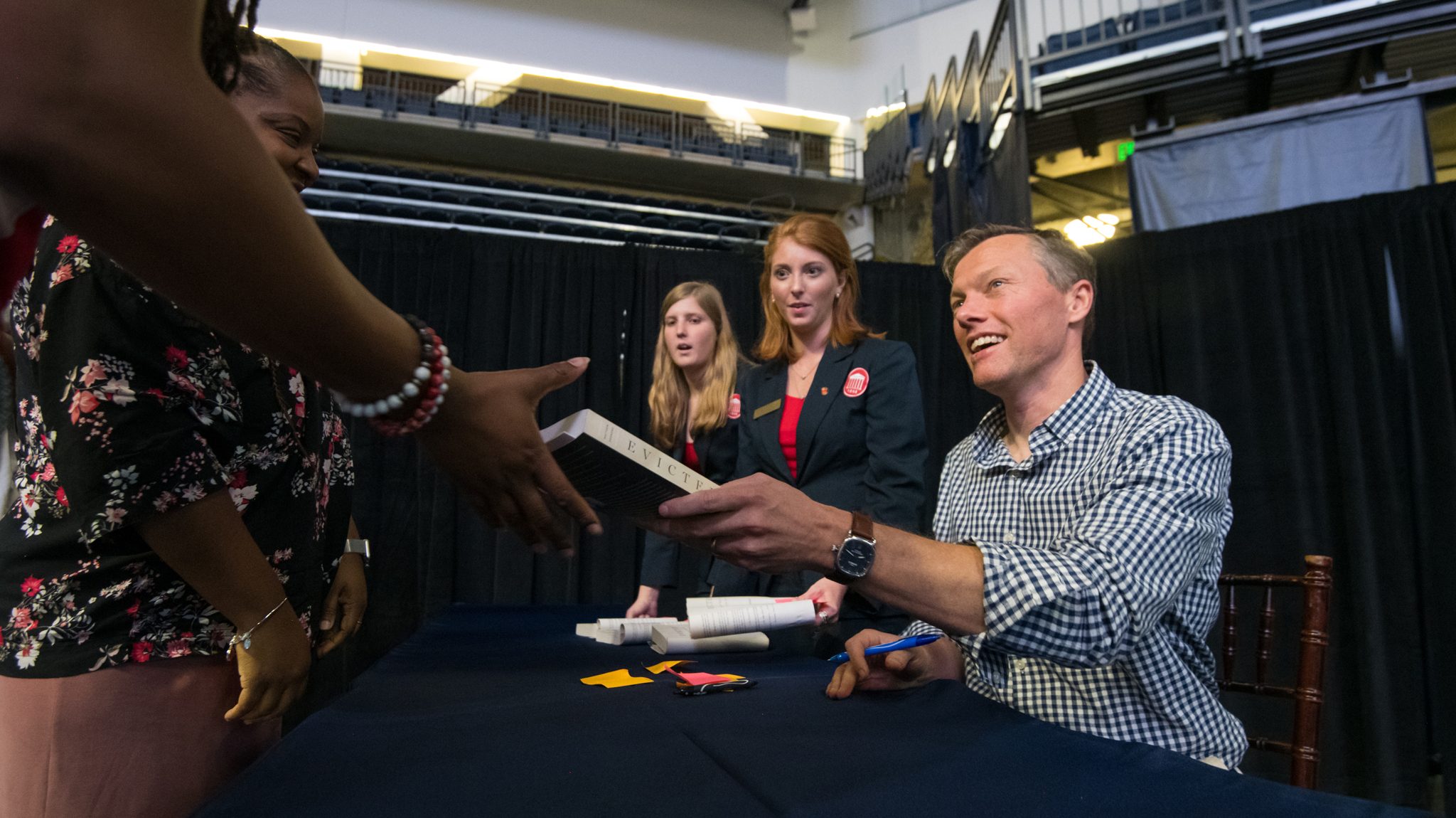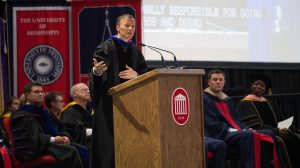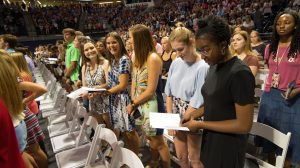
Sociologist and author Matthew Desmond signs copies of ‘Evicted’ Tuesday evening at the University of Mississippi’s 2019 Fall Convocation. Desmond, who was the keynote speaker, authored the book, which is the university’s 2019 Common Reading Experience selection. Photo by Kevin Bain/Ole Miss Digital Imaging Services
OXFORD, Miss. – Pulitzer Prize-winning author and Princeton sociologist Matthew Desmond advised the University of Mississippi‘s class of 2023 that they have power to change their world and should commit themselves to a life of advancing the greater good.
Desmond, who delivered UM’s Fall Convocation keynote address Tuesday (Aug. 27) evening, is the author of “Evicted” a New York Times bestseller that is the university’s 2019 Common Reading Experience selection.
When the book won the Pulitzer in 2017, the prize committee praised it as “a deeply researched expose that showed how mass evictions after the 2008 economic crash were less a consequence than a cause of poverty.” Desmond’s own parents lost their home to foreclosure when he was a college student, which shaped his experience.
He told the thousands of UM freshmen gathered at the Pavilion that human existence is so dynamic they can’t help but affect the lives of those around them, either by their action or indifference to the problems of the world. It is their responsibility to help others, he said.
“Personal responsibility has to do with our connection to the problem, but civic responsibility has to do with our connection to the solution,” Desmond said. “When the levee breaks and the floodwaters come rushing through your town, it isn’t the levee that has your name on it; it’s the sandbag.”
It’s been said that Desmond’s book serves as a landmark of journalism that could forever change the way poverty and economic exploitation is viewed in America. As the selection for the Common Reading Experience, “Evicted” will be the focus of campuswide discussions throughout the 2019-20 academic year.

Sociologist and author Matthew Desmond gives the keynote address Tuesday (Aug. 27) at the 2019 Fall Convocation. Photo by Kevin Bain/Ole Miss Digital Imaging Services
All incoming freshmen and transfer students were given copies of the book with instructions to read it before the fall semester began. Instructors will use the book in their classes, and faculty and staff are also encouraged to read “Evicted.”
Desmond told students that they inherit a world with many problems, including having one in six Americans lacking the funds to afford basic necessities, which is the exact definition of poverty. There’s also racial injustice, high incarceration rates, low wages, food insecurity, political disenfranchisement, species extinction and myriad other issues to battle.
Students can start by becoming involved in campus groups that are already working on causes important to them, and build coalitions of those willing to work on the same issues, he said.
Changing minds through civil dialogue with fellow students is also important, especially those with different viewpoints, he said. College provides a perfect opportunity to meet people from diverse backgrounds and ideologies.
Dialogue, not debate, should be the goal.
“In a debate, you are not trying to understand; you are trying to dominate someone,” Desmond said. “It is extremely rare to walk away from a debate having learned anything. We should be firm in our own convictions, determined in our questions and confident in our knowledge. But the goal should be dialogue, not a sparring match.”
“… To change how someone believes, you have to be vulnerable in front of them and admit where your own ideas fall short.”
There is much work to be done, but a life of trying to change the world for the better is absolutely worth living, he said. The solutions are within reach, but we all have to reach, he continued.
“It’s my hope for you that as the years pass, you come more and more to hate poverty and racism and exploitation and injustice. That you hate it, that you come more and more to hate environmental destruction and cancer and pain, and unfair and broken systems, and that you, in your own way, come to defend the rights of the oppressed and find a way to entwine your life with the lives of those who need you.
“That you end up experiencing the great problems of the world, as Nietzsche put it, with your body and your soul.”
Interim Chancellor Larry Sparks impressed upon students that in addition to the world’s future, each of them is critical to the university’s future.
“Each and every one of you have something very important in common,” Sparks said. “You chose Ole Miss. You are what makes Ole Miss work. You are the heart and the soul of this university.
“I look forward to hearing and reading about your many successes and achievements because I know you are ready to achieve great things as Ole Miss Rebels.”

The 2019 freshmen class participates in the 2019 Fall Convocation on Tuesday (Aug. 27) at The Pavilion at Ole Miss. Photo by Kevin Bain/Ole Miss Digital Imaging Services
Provost Noel Wilkin said Convocation, which represents the freshmen joining the university’s community of scholars, and Commencement form the “bookends” of their academic journey, and now the real work begins.
“Fall Convocation marks the beginning of a new journey, one that we trust will be more exciting or rewarding and more challenging,” Wilkin said. “Through your involvement in our community over the next few years, you will make a valuable contribution to the strength, energy and mission of our university.”
Brandi Hephner LaBanc, UM vice chancellor for student affairs, presented the class with “challenge coins,” which are to serve as a reminder that their challenge is to earn their degree from the university.
The coins, given to each freshman class every fall, this year feature the image of the Ole Miss Student Union, which has recently reopened after a massive renovation and expansion project, giving students a true “living room” on campus.
“I am encouraging each of you to spend time there, grab a meal with friends and engage in dialogue with someone new to you,” Hephner LaBanc said. “He or she may become your trusted confidant. Go there to learn more about joining a student group or volunteering in our community.
“Visit the Center for Inclusion and Cross-Cultural Engagement and learn about peers unlike you and their life experiences. Go to the Union and be engaged and make this a more welcoming place for all members of our campus community.”